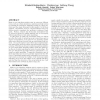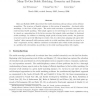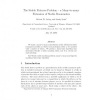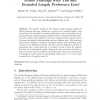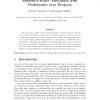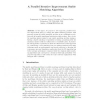115
click to vote
CORR
2011
Springer
14 years 9 months ago
2011
Springer
Many-to-one matching markets exist in numerous different forms, such as college admissions, matching medical interns to hospitals for residencies, assigning housing to college st...
DAM
2007
15 years 2 months ago
2007
We study a many-to-many generalisation of the well-known stable roommates problem in which each participant seeks to be matched with a number of others. We present a linear-time a...
121
click to vote
ALGORITHMICA
2010
15 years 2 months ago
2010
We consider the following version of the stable matching problem. Suppose that men have preferences for women, women have preferences for dogs, and dogs have preferences for men. T...
105
click to vote
ALGORITHMICA
2010
15 years 2 months ago
2010
Let I be a stable matching instance with N stable matchings. For each man m, order his (not necessarily distinct) N partners from his most preferred to his least preferred. Denote...
136
click to vote
ALGORITHMICA
2010
15 years 2 months ago
2010
Abstract. We consider the variant of the classical Stable Marriage problem where preference lists can be incomplete and may contain ties. In such a setting, finding a stable matchi...
138
click to vote
ACID
2006
15 years 3 months ago
2006
We consider variants of the classical stable marriage problem in which preference lists may contain ties, and may be of bounded length. Such restrictions arise naturally in practic...
105
click to vote
CTRSA
2007
Springer
15 years 6 months ago
2007
Springer
At Financial Crypto 2006, Golle presented a novel framework for the privacy preserving computation of a stable matching (stable marriage). We show that the communication complexity...
129
click to vote
ISAAC
2003
Springer
15 years 7 months ago
2003
Springer
We study the problem of allocating students to projects, where both students and lecturers have preferences over projects, and both projects and lecturers have capacities. In this...
125
click to vote
HIPC
2003
Springer
15 years 7 months ago
2003
Springer
Abstract. In this paper, we propose a new approach, parallel iterative improvement (PII), to solving the stable matching problem. This approach treats the stable matching problem a...
